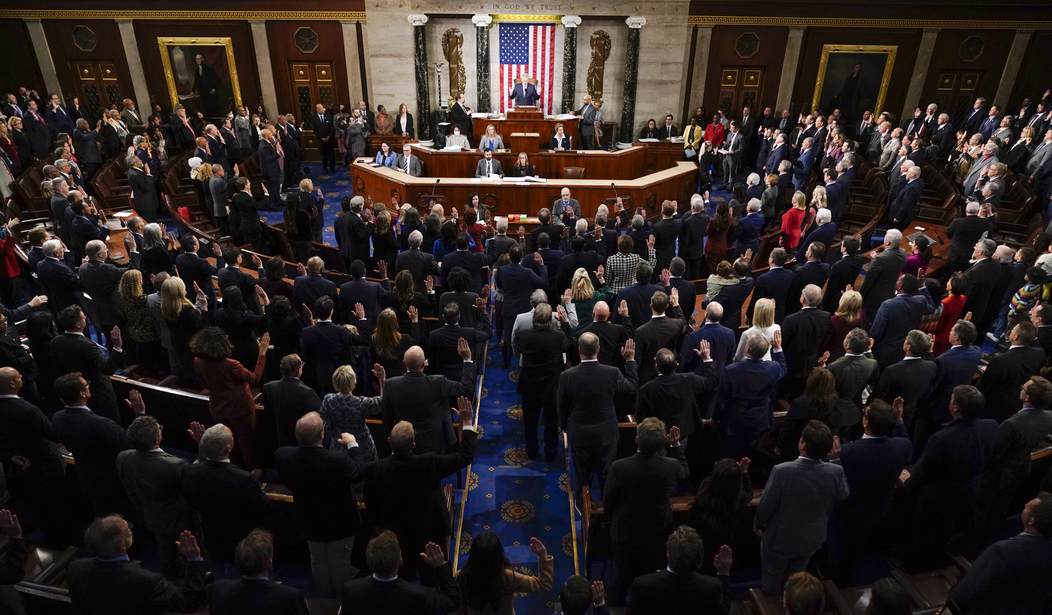Thanks to some last-minute horse-trading by Speaker Kevin McCarthy, House Republicans barely passed a bill that would raise the U.S. debt limit and avoid default.
The vote was 217 to 215, with four Republicans — Ken Buck of Colorado, Andy Biggs of Arizona, Tim Burchett of Tennessee, and Matt Gaetz of Florida — voting against it. The four holdouts all want steeper cuts in government spending than McCarthy was willing to go.
Not that it matters. All 51 Senators who caucus with the Democrats are on board with Joe Biden’s absolute refusal to negotiate on the debt ceiling. Biden says he won’t even talk to McCarthy about raising the debt limit.
“They haven’t figured out the debt limit yet,” Biden told reporters in the Rose Garden, referring to House Republicans. “I’m happy to meet with McCarthy, but not on whether or not the debt limit gets extended. That’s not negotiable.”
Related: Joe Biden Threatens to ‘Finish the Job’
Lawmakers got a piece of good news from the investment firm Goldman Sachs on Wednesday claiming that, based on IRS tax receipts coming in higher than expected, the drop-dead date for default has moved to sometime in late July.
“We maintain our base case that the debt limit deadline will be in late July, now with increased confidence as revenues are once again close to our projections,” economists there said in a note.
It was absolutely critical for Republicans to be unified on this issue. Now the ball is in Biden’s court and the pressure is on the president to make a move toward McCarthy and the Republicans.
“Any president that refuses to negotiate does so at their own peril and to the detriment of the American economy,” McCarthy said. “This president is putting himself in a terrible position. And us passing this bill this week will show that House Republicans have a position, we’ve raised the debt limit, we’ve made an offer, and we have a menu of options we’ve put before the president. He needs to come to the table and start being a grown-up in this situation and negotiate with the legislative branch.”
The package raises the nation’s $31.4 trillion debt limit by an additional $1.5 trillion. But the plan also states that if the new debt limit is not breached by March 31, 2024, then Congress must again increase the borrowing authority by that date, proposing to reignite a major fiscal battle in the middle of a presidential election year.
In their “Limit, Save, Grow Act,” House Republicans propose sizable cuts to domestic programs and intend to spare the Pentagon’s budget, returning funding for federal agencies to 2022 levels while aiming to limit the growth in spending to 1% per year. The nonpartisan Congressional Budget Office said that the bill would trim government deficits by $4.8 trillion over 10 years.
As part of the 320-page bill, the GOP also proposes to block Biden’s plan to grant student loan forgiveness, repeal green energy tax credits and kill new Internal Revenue Service funding enacted as part of the Inflation Reduction Act. The measure would also impose new proposals to give Congress more power to halt regulations from the executive branch. The plan would also expedite new oil drilling projects while rescinding funding enacted to respond to the Covid-19 pandemic.
Something that was removed from the bill was a repeal of ethanol subsidies so beloved by farm-state Republicans. All four House Republicans from Iowa said repealing the subsidies was a bridge too far and they would oppose raising the debt limit unless they were added back. McCarthy obliged.
At the very least, this is a very clever move by McCarthy and the House Republicans. Biden is not going to roll the dice and risk default — not while the GOP has a plan already in place. The president can’t very well go to the voters and claim he did everything possible to avoid default when all Republicans are asking is that he sit down and negotiate.
Very few of these budget cuts are likely to be in a final debt limit package. Certainly not the work requirements for entitlement programs. My guess is that Biden will give on spending cuts in budget out years (the four or nine fiscal years that follow the budget year) while McCarthy will agree to a larger increase in the debt limit.
Otherwise, we may be about to see a grand experiment in governance; a $27 trillion economy deliberately and consciously going into default.










Join the conversation as a VIP Member